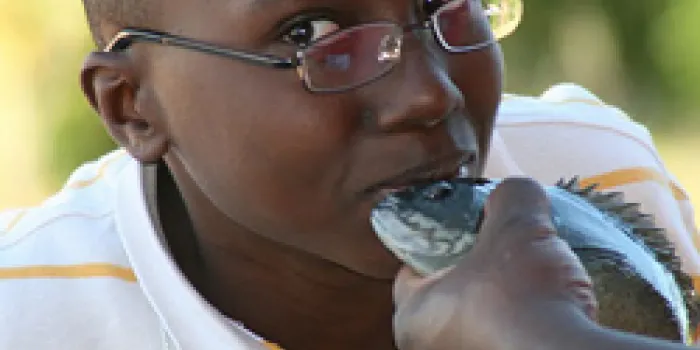“You catch a fish, you kiss the fish, and then you throw it back,” explains Janet Brewer, MS, CEO of Comprehensive Health Education Services (CHES).
Fish kissing is just one of the many fun activities scheduled for CHES’s Inhibitor Family Camp, October 14–16, 2011, at Camp Victory Junction, in Randleman, North Carolina. The weekend will offer families living with hemophilia with inhibitors a chance to come together and share experiences, make connections, and most importantly, have fun.
Victory Junction, a part of Paul Newman’s Association of Hole in the Wall Camps, is a camp for children with chronic disorders. Situated on 84 acres, which includes a comprehensive medical facility, Victory Junction is partnering with CHES to offer activities for families such as horseback riding, archery, bowling, karaoke and a racecar simulator. For kids, there will be team-building exercises, special activities for siblings and puppetry workshops.
[Steps for Living: All About Camps]
Brewer, who developed the camp in 2010 with Jane Cavanaugh Smith of Shrewsbury, Massachusetts, recognized that it was important for kids with inhibitors to have the same camp experience as those without inhibitors have. “Sometimes, when a child with an inhibitor goes to a regular hemophilia camp, he will be the only one with an inhibitor,” says Brewer. “He will be sitting there watching everyone else do things that they can’t or shouldn’t do.” Brewer is the mother of two boys with hemophilia, one of whom has an inhibitor. Smith’s son also has hemophilia with an inhibitor. “We both know how hard that can be for boys,” Brewer says. “We wanted to do something about it."
How Hemophilia Inhibitors Develop
Inhibitors result when the immune system of a person with hemophilia identifies clotting factor as an antigen—a foreign substance in the body—and creates an antibody, or inhibitor, to neutralize it. For people who develop inhibitors, clotting factor is either much less effective or ineffective. The Centers for Disease Control and Prevention (CDC) estimates fewer than 1,000 of the approximately 18,000 people with hemophilia in the US have an inhibitor, making these people a minority within an already small population.
To help patients and families dealing with inhibitors the National Hemophilia Foundation (NHF) offers three educational programs through the Inhibitor Education Summits. However, Brewer stresses that the summits and the inhibitor family camp are very different in scope.
“NHF’s Inhibitor Summits are a wonderful way for people to get education on treatments and research,” Brewer says. “Our family camp focuses more on the emotional component, particularly on helping parents and children cope, and develop a support system within their community.”
It was important to Brewer that the Inhibitor Family Camp provide opportunities for parents to talk openly about the difficulties of living with an inhibitor. Many parents feel isolated. “There are universal experiences to living with this particular condition, but unless parents are given space and time to sit down and really discuss these things, they’ll go on feeling like they’re the only ones who have these feelings,” Brewer says.
In 2010, the camp offered a parents’ session, facilitated by Lauren Mednick, PhD, an assistant in psychology at Children’s Hospital Boston. She works on their medical coping team. “When parents hear other people’s stories, they think, ‘Oh, this doesn’t just happen in my family. I’m finally in a room with people who know what my life is like,’” says Brewer. “It’s an incredibly unifying experience.”
The camp is open to 25 families with children between the ages of 6 and 19. For more information on how to apply, go to the Inhibitor Family Camp Web site.
The Inhibitor Family Camp is fully funded by Novo Nordisk.
[Steps for Living: Family Life]

